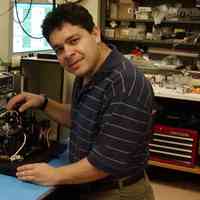ECS will be offering five short courses at the 229th ECS Meeting this year in San Diego.
What are short courses? Taught by academic and industry experts in intimate learning settings, short courses offer students and professionals alike the opportunity to greatly expand their knowledge and technical expertise.
Short Course #1: Basic Corrosion for Electrochemists
Luis F. Garfias-Mesias, Instructor
This course covers the basics of corrosion science and corrosion engineering. It is targeted toward people with a physical sciences or engineering background who have not been trained as corrosionists, but who want to understand the basic concepts of corrosion, learn to select the appropriate materials an know which will be the typical techniques and methodologies to test and qualify materials (resistant to corrosion).
The course will begin with a general, basic foundation of electrochemistry and corrosion. It will cover the typical engineering materials (metals, non-metals, composites, etc.) and their interaction with their environment (temperature, pressure, gasses, liquids, etc.) and the common methodologies to prevent and control their degradation (material selection, adding inhibitors, applying a protective coating, using cathodic or anodic protection, etc.). Basic knowledge of corrosion monitoring and inspection as well as field and laboratory testing will be covered.
Course outline:
– Introduction to Corrosion
– Types of Corrosion
– Interactions of Materials and the Environment
– Corrosion Control
– Corrosion Monitoring and Inspection
– Basic Corrosion Testing
– Advanced Corrosion Testing (Electrochemistry and Microscopy)
– Case studies and lessons learned from failure analysis and corrosion projects
About the instructor:
Luis F. Garfias has a Chemical Engineering degree from the University of Yucatan (in Mexico). He has a M.Sc. on Corrosion Science and engineering from UMIST (UK) and a Ph.D. on Materials Science from Oxford University (UK). Luis was a Postdoctoral Researcher at the Corrosion Research Center in the University of Minnesota (USA) working under Prof. William Smyrl on in-situ microscopy and corrosion of implant materials.
From 1998 to 2005 Luis became a Principal Scientist at Bell labs where he managed the Reliability and Corrosion Materials Laboratory and did pioneering work on Corrosion of Electronic materials and devices. From 2005 to 2007 Luis was the head of the Corrosion Laboratory at SC Johnson where he worked on accelerated methodologies to test and qualify materials used in consumer products. From 2007-2012 Luis worked as the Director of Technology Qualification at DNV Columbus where he invented the mini-autoclave to perform in-situ microscopy at High Pressure and High Temperature (HP/HT) in sour environments an worked in many projects related to oil and gas. Luis was recently the Director of Materials and Testing at Intertek and currently is a Consultant at Wood Group Kenny House in Houston. Luis works on projects related to Materials Science and Materials Engineering, Asset Integrity Management and novel techniques for microscopy at HP/HT in aggressive environments. Luis is an active member of NACE, ECS and ACS and has published several scientific papers for major corrosion and Materials Science journals.
Register by the early-bird deadline, April 29, 2016 and Save $$!
Short course registration closes on May 23, 2016.

